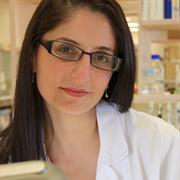
Professor Mary Tolcos
Professor
Details
-
Department: Health and Biomedical Sciences
-
Campus: Bundoora West Australia
-
mary.tolcos@rmit.edu.au
-
ORCID: 0000-0001-6105-4553
Open to
- Masters Research or PhD student supervision
About
Research group bio: Research in the Neurodevelopment, Protection and Repair Group focuses on understanding fundamental aspects of brain development, and applying this knowledge to conditions of compromised brain development to develop novel therapeutics. One of our research questions is how does the cerebral cortex fold? Cortical folding, or gyrification, is a process that is unique to humans and higher mammals, and errors in cortical folding can lead to schizophrenia, autism and epilepsy. However, the mechanisms that underpin this process are not fully understood. To address this unresolved question, we are studying the cellular and genetic mechanisms that drive folding of the cerebral cortex using comparative brain histology, neuroimaging, RNA sequencing, cerebral organoids and gene silencing technology in collaboration with engineers and neuroimaging specialists. We also investigate brain development, brain maturation, and long-term behavioural outcomes following fetal growth restriction and preterm birth, two of the main contributors to newborn mortality and morbidity, and poor mental health outcomes in adolescence. To investigate this, in collaboration with the Murdoch Children’s Research Institute, we are using neuroimaging data collected from the Victorian Infant Brain Study (VIBeS) to identify early brain changes that may provide a biomarker of adolescents at risk of developing anxiety disorders. We also aim to improve the lives of vulnerable children by testing neuroprotective strategies to prevent and/or repair developmental brain injury using preclinical models. To date, our ongoing work has identified that treatment using a thyroid hormone analogue has the potential to reverse the cerebral myelination deficits that occur in fetal growth restriction. To facilitate the translational potential of this preclinical research, we work closely with clinicians at Monash Children’s and The Royal Women’s Hospital, and RMIT engineers to deliver therapies using a non-invasive and easy-to-use device.
Supervisor projects
- Is perinatal brain injury and neuroprotection associated with the altered biochemical response of polydendrocytes?
- 8 Feb 2026
- Unravelling the potential for mammalian brain regeneration
- 23 Dec 2025
- Regeneration of the brain following neonatal stroke
- 12 Dec 2025
- Early Detection and Rapid Clinical Response in Rural Critical Care through a Nurse-Led, Smart Enabled Mobile Early Warning System
- 24 Nov 2025
- Is perinatal brain injury and neuroprotection associated with the altered biochemical response of polydendrocytes
- 26 May 2025
- Unravelling the potential for mammalian brain regeneration
- 3 Jul 2024
- Regeneration of the brain following neonatal stroke
- 21 Mar 2024
- Unravelling the Potential for Mammalian Brain Regeneration
- 6 Mar 2024
- Cerebral organoids: precision medicine tools for cerebral palsy and other neurodevelopmental disorders
- 30 Oct 2023
- Enabling Repair and Regeneration after Neonatal Stroke
- 10 Apr 2022
- Understanding the Genetics of the Outer Subventricular Zone as a Primer for Gyrification
- 4 Jan 2021
- Thyroid Hormone Analogues: Promising Therapeutic Avenues to Improve Neurodevelopmental Outcomes of Intrauterine Growth Restriction
- 30 Jan 2020
- Comparative Analysis of Subplate Structure and Function in the Gyrencephalic and Lissencephalic Brain
- 12 Dec 2019
- Studies on Induced Pluripotent Stem Cell Models of Cortical Gyrification and Neurodevelopmental Disorders: Novel Generation of a Ferret Cerebral Organoid
- 19 Nov 2019
- Recovery from Penetrating Brain Injury in Adult Spiny Mice and C57BL/6 Mice: A Quantitative Comparison
- 12 Mar 2019
- Studies on the Interactions Between Microglial Maturation and Perinatal Challenges in Neuroinflammatory Responses
- 2 Jul 2018
- Investigating the Capacity of Creatine to Prevent Hypoxic Damage in the Perinatal Brain
- 1 Mar 2018
- Neural Correlates of Internalising and Externalising Problems in Children Born Very Preterm: A Prospective Longitudinal Study
- 1 Mar 2018
- A Thyroid Hormone Based Therapy to Restore Brain Maturation Following Foetal Growth Restriction
- 11 Jul 2016
Teaching interests
Supervisor interests
- Brain development
- Perinatal brain injury
- Fetal growth restriction
- Prematurity
- Fetal hypoxia
- Neuroprotection
- Myelination,
- White matter injury
- Cerebellum
- Cerebral palsy
- Cortical Folding/Gyrification
Research interests
- Paediatrics and Reproductive Medicine
- Neurosciences
- Developmental neuroscience


